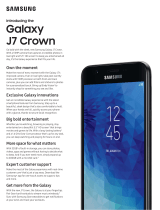
8
English
Safety InformationSafety Information
Safety Information
Do not attempt to repair, disassemble, or modify the appliance yourself.
࡙ Do not use any fuse (such as copper, steel wire, etc.)other than the standard fuse.
࡙ Failing to do so may result in electric shock, fire, problems with the product, or
injury.
CAUTION
Do not place objects or devices under the indoor unit.
࡙ Water dripping from the indoor unit may result in fire or property damage.
Check that the installation frame of the outdoor unit is not broken at least once a year.
࡙ Failing to do so may result in injury, death or property damage.
Max current is measured according to IEC standard for safety and current is
measured according to ISO standard for energy efficiency.
When the air conditioner does not operate properly for cooling or heating, there
is a possibility of refrigerant leakage. If any leakage, stop operation, ventilate the
room, and consult your dealer immediately for recharging refrigerant.
The refrigerant is not harmful. However, if it comes in contact with fire, it may
generate harmful gases and there is risk of fire.
During transportation of the indoor unit, the pipe lines shall be covered with
brackets for protection. Do not move the product with holding the pipe lines.
࡙ It may cause gas leakage.
Do not install the product in a ship or a vehicle (such as a campervan).
࡙ Salt, vibration or other environmental factor may cause the product malfunction,
electric shock or fire.
Do not stand on top of the appliance or place objects (such as laundry, lighted
candles, lighted cigarettes, dishes, chemicals, metal objects, etc.) on the
appliance.
࡙ This may result in electric shock, fire, problems with the product, or injury.
Do not operate the appliance with wet hands.
࡙ This may result in electric shock.
Do not spray volatile material such as insecticide onto the surface of the
appliance.
࡙ As well as being harmful to humans, it may also result in electric shock, fire or
problems with the product.




















